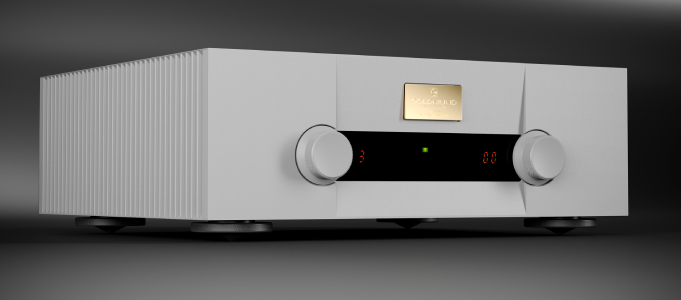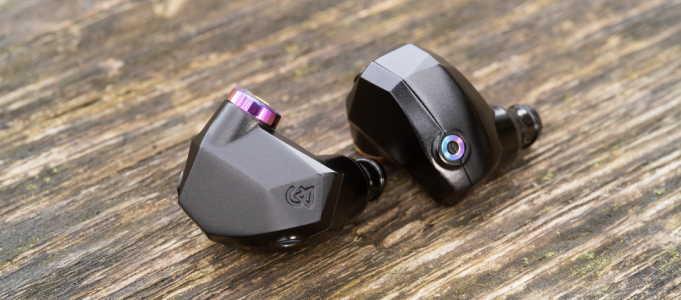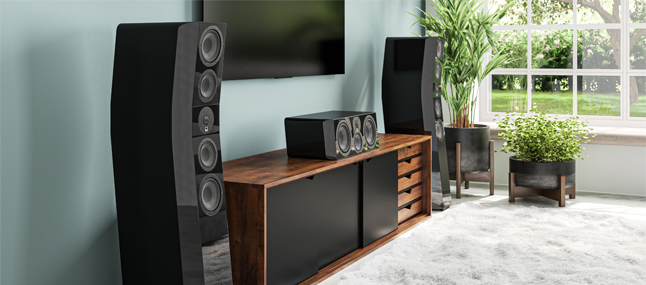Origin Live Discovery 1 Phono Stage Review

James Michael Hughes gets into the groove with this fine mid-price phono stage…
Origin Live
Discovery 1 Phono Stage
£990

Discovery 1 is the entry-level phono stage from Origin Live – a company that knows a thing or two about vinyl, having been around since the mid-nineteen eighties, no less. It caters for MM and MC cartridges and offers variable gain (46dB, 56dB, and 66dB), plus a choice of loading impedances – 100, 240, 400, 820, and 47k ohms – selectable via front panel switches.
Measuring just 175x105x60mm, it is compact and entirely self-contained, thanks to the built-in power supply. Although described as an 'entry level' product, the £990 Discovery 1 has much in common with Origin Live's Discovery 2 phono stage that sells for almost twice the price. The main difference is that the pricier version offers a balanced analogue output, while Discovery 1 has just a regular unbalanced out. It also features a larger outboard power supply rather than one that's built-in.
The little Origin Live is housed in a sturdy, well-finished aluminium box with a classy, solid-looking 10mm thick brushed-aluminium front panel. Being compact is not necessarily a bad thing; it means short signal paths – very important with low-level signals. Also, it's simple and straightforward to use and install, and the impedance and gain switches can be turned without producing audible clicks or thumps. Additionally, having everything accessible from the front is so much nicer than groping with fiddly little DIP switches!

Discovery 1 is blessedly free from hum or buzz despite that built-in mains power supply. It can accept voltages from 100V to 240V, showing real attention to detail in its design and build. Residual hiss levels are low but slightly higher than some similar phono stages I've tried, such as Lehmann's Black Cube SE-II. However, noise won't be an issue providing your MC pickup has about 0.5mV output or higher – any hiss will be below the noise of even the quietest LP. With pickups having significantly less than 0.5mV, you might just detect a very gentle sound when the record isn't playing.
Noise is always a potential issue with ultra-low output pickups, regardless of the phono stage used. If using a cartridge with an output much less than 0.4mV, I would partner it with a good MC step-up transformer to lift the output voltage without introducing noise. That shouldn't be an issue for most people, though, as the output of modern moving coils is generally considerably higher.
Discovery 1 features passive RIAA equalisation, and the circuits dispense with negative feedback. The input is direct-coupled, and Origin Live says the absence of a DC blocking capacitor is an important and uncommon design feature that's rare even in very expensive phono stages. Fitting a capacitor is a simple and inexpensive way to protect the cartridge's delicate coil windings from being damaged by DC, should a circuit fault occur. Inevitably though, given how small the signal voltage is, having a capacitor adversely affects sound quality. Origin Live was able to dispense with the input capacitor by using a balanced power supply. As well as eliminating the risk of DC burning the coils out, a balanced power supply also offers rejection of common-mode noise.

The grounding post is rather small, and – positioned between the input and output sockets – there isn't much space for your fingers. It's best to tighten it using a hex driver. Interestingly, I didn't find Discovery 1 too fussy over grounding. Something missing that I would have liked to have seen is a stereo/ mono switch. By playing monophonic LPs in mono, pressing rumble, and other noises are cancelled out, resulting in a cleaner sound. Alas, very few phono stages have this useful feature.
No mains-on/ off switch is provided. However, Discovery 1 draws very little power and runs cool. Origin Live reckons it takes three or four hours to thoroughly 'warm up' from cold, so the recommendation is to just leave the unit switched on all the time, apart from when you're away on holiday, of course.
THE LISTENING
I used my review sample of the Discovery 1 with a Transfiguration Temper W MC cartridge fitted to an Origin Live Illustrious tonearm on a Resolution turntable. First impressions were of a smooth and open sound that was focused and natural. The music had an effortless clarity and lots of crisp detail.
With the Transfiguration Temper W having an output of about 0.5mV, you can choose either the high or medium gain settings – both will work. The high gain option gave me increased impact and immediacy, while the medium gain setting sounded slightly mellower and more relaxed.

One of the first discs I played was ELO's 1976 album A New World Record. It's a fairly well-recorded LP for the period but can sound a bit grainy and congested. However, Discovery One took away any sense of grunge, delivering excellent clarity and transparency.
Tonally, this phono stage delivers a sound that's commendably well balanced. Bass is deep and firm, while the treble has a nice, silky sweetness which is very beguiling. Playing the old audiophile favourite Jazz at the Pawnshop, I was surprised by how dynamic and holographic the sound was. On Jeep's Blues, one of the quieter tracks, I was impressed by the presence of the solo sax and the multi-dimensional manner in which it projected out from a silent background. The climax towards the end of the track sounded amazingly vibrant, filling the room with sound.
Next, I tried Bob Downes' Open Music, an experimental jazz album on Philips that I've known since its release back in 1970. Unfortunately, cutting levels are a bit low on this LP, and, as a result, the sound can lack presence. Also, due to the age of the vinyl, a slight degree of surface rustle is apparent at times. Using a Lehmann Black Cube SE-II phono stage, the sound was crisp but just a tad dry. The overall result was good, but dynamically the music didn't project as powerfully as I'd have liked. I was also slightly bothered by the surface noise of my half-century-old pressing.

The Discovery 1, on the other hand, seemed to separate the music from the noise better; because the music projected more strongly, background noise was less obtrusive. It was almost as though the music was lighter and more buoyant, thus floating above the noise. Subtle shifts of tone colour and microdynamics made it feel like listening to the original mastertape rather than an imperfect vinyl record. Discovery 1 revealed a nice tonal sheen on this LP, making it sound full and sweet rather than hard and dry.
I noticed a similar improvement playing Dusty Springfield's Greatest Hits, a nineteen eighties pressing on Philips. Being a compilation, the recordings (a mix of mono and stereo) were made at different times in various studios. So there's quite a variation in sound quality and tonal balance between tracks. Using Discovery 1, each track sounded distinct, individual and perfectly good in its own way. Older recordings like these tend to sound acceptable on small speakers with limited bandwidth but not so good on hi-fi systems which highlight faults.
True, many tracks do have technical limitations and suffer from things such as heavy compression, plus tape saturation due to over modulation – all of which coarsen the sound. Yet, despite this, the Discovery 1 revealed a lovely bloom to the recording once again. Many of these vintage recordings are actually rather good despite certain technical flaws. Those magnificently dramatic vocals displayed thrilling presence without stridency, making the result highly involving, musically. That's the great thing about the Discovery 1 – it focuses in on what's right with the recording, rather than emphasising the things that are wrong. The whole experience proved so enjoyable that I ended up playing both sides of the album.

Ditto with another eighties compilation LP of classic Phil Spector tracks. I've owned this album for almost forty years, and it's always sounded poor. I last played it back in Jan 2021 when Spector's death was announced. It sounded okay, but the result was rough and congested by audiophile standards, lacking in depth and presence. Since upgrading my speakers in the summer of 2021, albums like this are now sounding a whole lot better. Adding Discovery 1 was the cherry on the cake. At last, I could hear all the myriad vocal and instrumental parts inside that fabled 'Wall of Sound' layering.
Comparing Origin Live's Discovery 1 to Lehmann's Black Cube SE-II on Songs from Liquid Days by Phillip Glass, and the former sounded firmer, cleaner, and fresher, while surface ticks and pops seemed softer and less irksome. How much all this is down to the absence of that DC blocking capacitor is hard to say, but Discovery 1 does deliver a certain extra sweetness and refinement over other good phono stages; the sound has a reassuringly firm, solid quality, rather than a thin edgy fragility that so many 'affordable' phono stages seem to exhibit.
Trying a more recent LP, I really enjoyed the album Dust by the Melomaniacs. A chance acquisition (I was given this LP in a charity shop, having bought quite a few LPs and CDs) it turned out to be a real find; a highly enjoyable, slightly whimsical album, beautifully engineered. The sound is deliciously mellow, refined, yet very detailed and effortlessly holographic. Disc cutting and pressing are exemplary, and the whole package represents the modern vinyl experience at its best. Via Discovery 1, Dust sounded better than I'd ever heard it sound before.
THE VERDICT
 I came away extremely impressed by Origin Live's Discovery 1 and rate it among the best phono stages I've heard anywhere near this price. It's not just very capable in a technical sense, but rather it's great at communicating the big musical picture in a charming and natural way – which is the whole point of vinyl anyway!
I came away extremely impressed by Origin Live's Discovery 1 and rate it among the best phono stages I've heard anywhere near this price. It's not just very capable in a technical sense, but rather it's great at communicating the big musical picture in a charming and natural way – which is the whole point of vinyl anyway!
Visit Origin Live for more information
James Michael Hughes
An avid audiophile for many decades, Jimmy has been writing about hi-fi since 1980 in a host of British magazines, from What Hi-Fi to Hi-Fi Choice. Based in London, England, he’s one of the UK’s most prolific record and CD collectors – no streaming service can yet match his amazing music collection!
Posted in:Hi-Fi Amplifiers Phono Preamplifiers Applause Awards 2022
Tags: origin live
JOIN IN THE DISCUSSION
Want to share your opinion or get advice from other enthusiasts? Then head into the Message Forums where thousands of other enthusiasts are communicating on a daily basis.
CLICK HERE FOR FREE MEMBERSHIP












